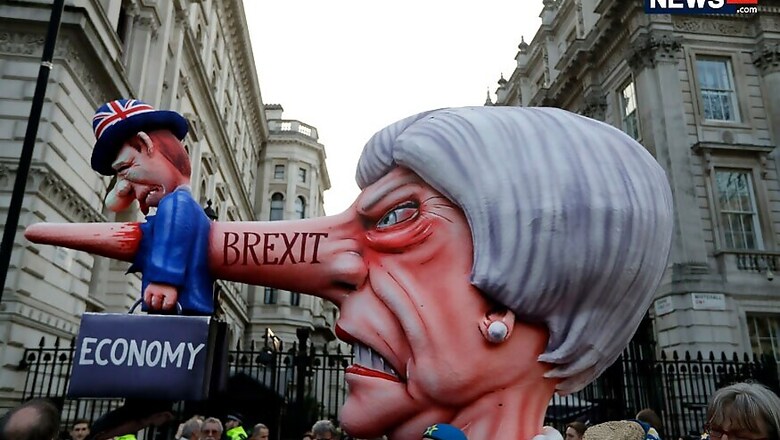
views
Who are the candidates vying for British Prime Minister Theresa May's job and what have they said about Brexit?
May has announced she is quitting, triggering a contest that will bring a new leader to power, with most of the front runners expected to push for a cleaner break with the European Union.
Here are the 11 Conservative lawmakers who have said that they are running, and what they've said about Brexit. They are arranged in the order listed by Oddschecker, a website that compiles bookmakers' odds.
BORIS JOHNSON, 54
The bookmakers' clear favourite was the face of the official campaign to leave the European Union. The former London mayor resigned as foreign minister in July last year in protest against May's handling of the exit negotiations.
Johnson said in a campaign video that Britain would leave the EU on October 31 "deal or no deal". He had also said that a second referendum on EU membership would be a "very bad idea" and divisive.
On Brexit: In a newspaper column, he said, "No one sensible would aim exclusively for a no-deal outcome. No one responsible would take no-deal off the table."
"If we are courageous and optimistic, we can strike a good bargain with our friends across the Channel, come out well and on time, by October 31, and start delivering on all the hopes and ambitions of the people."
Local media reported that he told a leadership hustings that the Conservatives would not be forgiven if Britain did not leave the EU by Oct. 31 and would face "political extinction."
Johnson was educated at Eton College and Oxford University.
MICHAEL GOVE, 51
Gove, one of the highest-profile Brexit campaigners during the 2016 referendum, scuppered Johnson’s 2016 leadership bid by withdrawing his support at the last moment to run himself.
Seen as one of the most effective members of May's cabinet as environment minister, Gove backed her Brexit strategy.
On Brexit: Gove said he believed he could unite the party and deliver Brexit.
Writing in the Daily Mail newspaper, Gove said he would seek a Canada-style free trade agreement with the EU, ruled out a second referendum, and pledged that Conservative lawmakers would be involved in shaping Britain's negotiating position.
"We must leave the EU as soon as we can. I want us to leave before October 31 and that will be my goal. I won’t be engaging in can-kicking or dithering," he said, adding that he would "always choose Brexit over no Brexit".
"If, finally, it comes to a decision between no deal and no Brexit, I will choose no-deal - it's a democratic imperative that we must leave the EU before the next general election or we risk letting (opposition Labour leader) Jeremy Corbyn into Downing Street. I’ve been involved in no-deal planning. I recognise, of course, it would mean short-term turbulence, but we would get through it and ultimately prosper," he said.
But Gove said he would not give up on progress and rush into a no-deal Brexit when a deal could be reached with "just a little more time and effort". Doing so could mean parliament forcing Britain into a general election, he said.
Gove, who was adopted as a child, was educated at Oxford University.
JEREMY HUNT, 52
Hunt replaced Johnson as foreign minister in July after serving six years as Health Minister. That role made him unpopular with many voters who work in or rely on the state-run, financially stretched National Health Service.
On Brexit: A remain supporter in the 2016 referendum, Hunt now says that while he would prefer to leave the EU with a deal, he believes a no-deal exit is better than no Brexit. However, in a Daily Telegraph article he became the most senior figure vying to succeed May to reject a threat to leave with no deal by the end of October, saying lawmakers would block any such move.
"Any prime minister who promised to leave the EU by a specific date – without the time to renegotiate and pass a new deal – would, in effect, be committing to a general election the moment parliament tried to stop it. And trying to deliver no-deal through a general election is not a solution; it is political suicide," he wrote.
"A different deal is, therefore, the only solution ... That means negotiations that take us out of the customs union while generously respecting legitimate concerns about the Irish border."
He has not however entirely ruled out a no-deal exit, saying he could consider it as a last resort.
Hunt was educated at Oxford. He speaks fluent Japanese.
ANDREA LEADSOM, 56
A pro-Brexit campaigner, Leadsom made it to the last two in the 2016 contest to replace Cameron. She withdrew after a backlash to an interview in which she said being a mother gave her more of a stake in the future of the country, seen by critics as an unfair attack on May, who has no children.
Leadsom quit as Leader of the House of Commons last month, saying she did not believe the government's approach would deliver on the Brexit referendum result.
On Brexit: She told the Sunday Times she would put significant effort into encouraging the EU to come up with a "deal that we can all live with" but also said Britain had to leave by the end of October, with or without a deal.
Leadsom was educated at the University of Warwick before spending 25 years in banking and finance.
DOMINIC RAAB, 45
Raab quit as May’s Brexit minister last year after just five months in the job, saying her draft exit agreement did not match the promises the Conservative Party made in the 2017 election.
He had held junior ministerial roles since being elected in 2010. Raab, a black belt in karate, campaigned for Brexit.
On Brexit: Raab told the BBC that he plans to seek a "fairer deal" with Brussels, including renegotiating the customs and border plans relating to Northern Ireland. He also said he would not delay Brexit beyond October however, and was prepared to leave without a deal.
Raab said he expected that if Britain left without a deal, it would be likely get to keep around 25 billion pounds of its 39 billion pound exit payment, and the government could use that money to support businesses through Brexit.
He caused a stir when he refused to rule out proroguing, or suspending, parliament until the Brexit deadline to prevent lawmakers from stopping a no-deal Brexit. Parliamentary speaker John Bercow said proroguing parliament would never happen and other candidates have criticised his stance.
Proroguing parliament, which usually happens once a year so the government can outline a new legislative programme, is a "prerogative power" - it is a decision for the prime minister, which is given effect by the Queen.
Hannah White, deputy director of the Institute for Government think tank, said, "Suspending parliament to prevent democratically elected representatives from making a decision you suspect they wish to take would amount to a coup against Parliament and risk bringing the Queen into a terrible conflict."
The son of a Jewish refugee, Raab was educated at Oxford University.
RORY STEWART, 46
A former diplomat who once walked 6,000 miles across Iran, Afghanistan, Pakistan, India and Nepal, Stewart was recently promoted to International Development Secretary.
Stewart was first elected to parliament in 2010 and backed remaining in the EU in the 2016 referendum. He opposes a "no deal" exit and has been a vocal advocate of May's deal with Brussels.
On Brexit: He told Sky News that he favoured a "pragmatic, moderate Brexit".
He said he would not seek to change May's withdrawal agreement which has been rejected by parliament three times and said anyone who said they could do so by October was "deluding themselves or deluding the country".
"We have a deal negotiated with the European Union on the Withdrawal Agreement. What I would be doing in parliament and with the British people is sorting out that political declaration and landing it so we can get out and move on."
Stewart was educated at Eton College and Oxford University.
SAJID JAVID, 49
Javid, a former banker and a champion of free markets, has served in a number of cabinet roles and scores consistently well in polls of party members. A second-generation immigrant of Pakistani heritage, he has a portrait of late Conservative Prime Minister Margaret Thatcher on his office wall.
On Brexit: Javid voted "Remain" in the 2016 referendum but was previously considered a eurosceptic.
Javid wants to reshape the existing Brexit deal and get it through parliament, but would be prepared to leave without a deal if that proves impossible.
"We should leave on October 31. And if we cannot get a deal we should, with great regret, leave without one, having done everything we can to minimise disruption,' he wrote in the Daily Mail.
He wants to ramp up no-deal preparations to show the EU that Britain is serious about walking away from talks.
Javid also said he was against a second referendum: "Never in this country's history have we asked people to go to the polls a second time without implementing their verdict from the first."
Javid, the son of a bus driver, was educated at Exeter University.
ESTHER MCVEY, 51
The pro-Brexit former television presenter, who resigned as work and pensions minister in November in protest at May's exit deal with the EU, said on Sunday Britain has to leave on Oct. 31 and "if that means without a deal, then that is what it means."
On Brexit: She wrote in the Daily Telegraph that no government she led would ever seek an extension beyond Oct. 31.
"We need to stop wasting time having artificial debates about renegotiating backstops or resurrecting botched deals. The only way to deliver the referendum result is to actively embrace leaving the EU without a deal," she said.
McVey, who was placed in a foster home shortly after she was born but later returned to her parents, was educated at Queen Mary University of London.
MATT HANCOCK, 40
Health minister Hancock, a former economist at the Bank of England, supported "Remain" in 2016. First elected to parliament in 2010, he has held several ministerial roles.
On Brexit: He told BBC Radio that leaving without a deal was not an option as parliament would not allow it. He said he was open to renegotiating May's deal with the EU but would focus on getting a Brexit deal through parliament.
Writing in the Daily Mail, he said the Conservatives needed to win back both pro-Brexit and pro-remain voters who had deserted it for other parties. He told Sky News he planned to renegotiate the future relationship with the EU and would explore the possibility of changing the Withdrawal Agreement.
"We need to leave the EU with a deal before 31st October. I still think that is deliverable," he said.
Hancock was educated at Oxford University.
MARK HARPER, 49
Harper, who was elected to parliament in 2005 after working as an accountant, has held junior ministerial positions and served as the government's chief enforcer in parliament under former Prime Minister David Cameron.
In 2014 he resigned as immigration minister after it emerged his cleaner did not have permission to work in Britain.
On Brexit: Harper supported remaining in the EU at the 2016 referendum but says he would now vote to leave. He told Sky News he would extend Article 50 to give time to secure an exit deal.
"I would rather be realistic with people and say actually if you want to leave with a deal, you want a serious attempt to get a good deal then it simply can't be done by Oct. 31."
"I want to leave with a deal but I do think if we can't get a deal that goes through parliament we need to leave without a Withdrawal Agreement but I think we will only persuade a majority in parliament of that if they think we have made a serious real attempt."
He was educated at Oxford University.
SAM GYIMAH, 42
Gyimah is the only candidate to back another Brexit referendum.
A former investment banker and entrepreneur, Gyimah entered parliament after the 2010 election. He was promoted to minister for universities in January 2018, but resigned 10 months later over May's Brexit deal.
He said he was joining the contest to "broaden the race".
"There is a wide range of candidates but there is a very narrow set of views on Brexit being discussed," he told Sky News.
"Parliament is deadlocked, we all know that," he said. "We want to be able to bring the country together so that is why I think a final say on the Brexit deal is the way to achieve that.
"I'll be the only candidate in the race offering this option which is supported by the vast majority of people in the public, in order to take us forward."




















Comments
0 comment